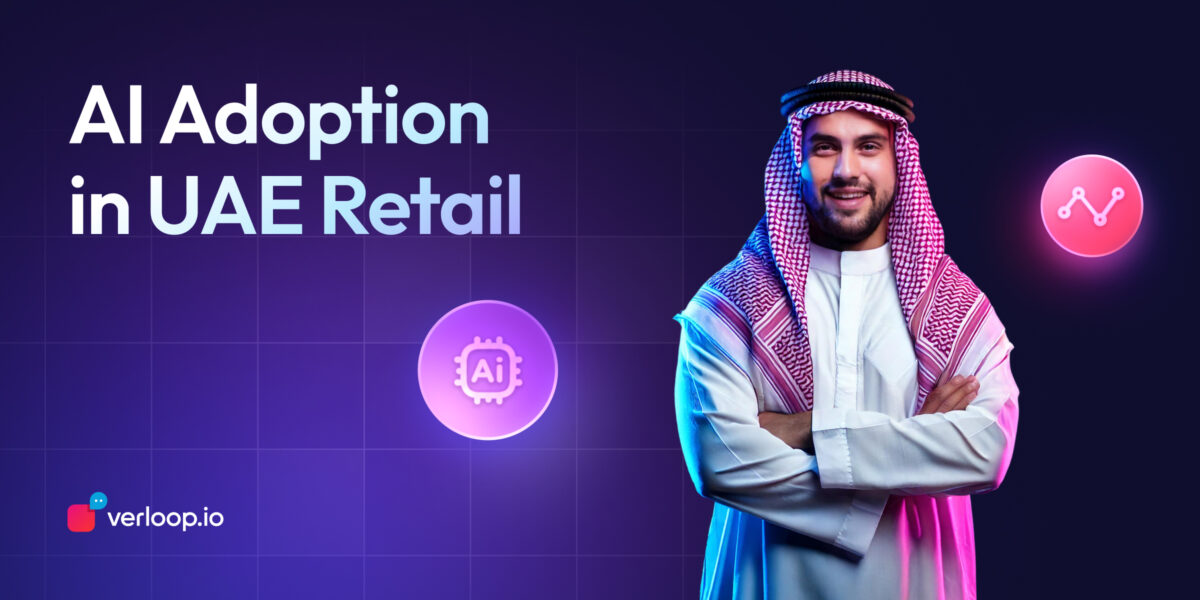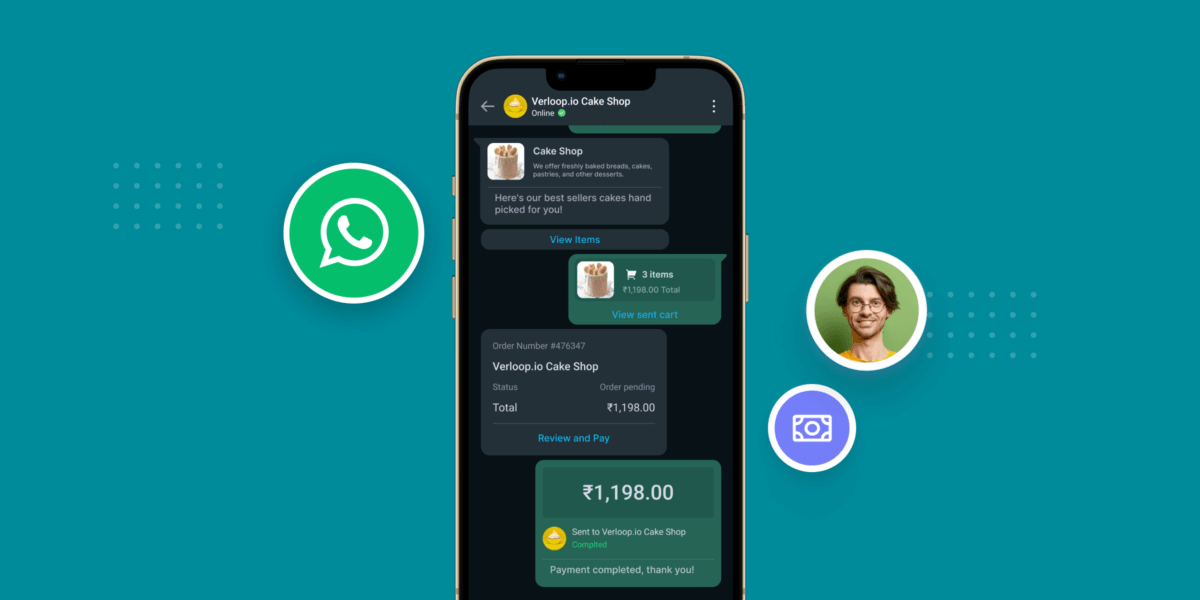
AI Adoption in UAE Retail for Improving Customer Experience
- July 16th, 2025 / 5 Mins read
-
 Aarti Nair
Aarti Nair
AI Adoption in UAE Retail
AI is changing the retail landscape in the UAE. Retailers are embracing AI to enhance customer experiences and streamline operations.
The adoption of AI in UAE retail is driven by the need to stay competitive. Retailers are leveraging AI to meet evolving consumer expectations.
AI technologies like chatbots and voice assistants are becoming commonplace. These tools offer personalised shopping experiences and improve customer service.
Arabic chatbots are gaining popularity, catering to the local population. They provide 24/7 support and reduce wait times for customers.
Verloop.io offers AI solutions tailored for the retail industry. Their focus is on customer engagement and automation, helping retailers thrive.
Phone call automation is another trend in UAE retail. It streamlines customer interactions and enhances service delivery.
Voice AI is also gaining traction, offering hands-free shopping experiences. Retailers are using it to provide convenience and efficiency.
The future of AI in UAE retail looks promising. Continuous advancements in technology and increased investment are expected.
The Rise of AI in UAE Retail
AI is reshaping the retail sector in the UAE, propelling it into a new digital age. The country’s vision to become a leader in AI technology supports this trend.
In recent years, AI adoption in UAE retail has accelerated remarkably. In the UAE, AI adoption is gaining momentum across sectors. Around 46% of users rely on AI for information retrieval, 33% use it for customer service and support, and 13% benefit from AI-powered personalised recommendations. The retail sector stands out, with many businesses embracing AI models to deliver customised shopping experiences based on individual customer behaviour and past purchases.
Retailers see AI as a way to boost efficiency and improve customer satisfaction.
Several key factors drive this AI in UAE retail:
- Changing consumer expectations demand personalised experiences.
- Increasing competition pushes retailers to innovate.
- Government policies promote digital transformation.
The UAE government’s proactive stance is crucial in fostering this growth. Its support through initiatives creates a conducive environment for AI integration.
Retailers are increasingly aware of AI’s potential to transform operations. By analysing consumer data, they tailor services to meet specific needs. AI technologies are also enhancing inventory management and supply chain optimisation. This leads to cost reduction and increased operational efficiency.
Challenges persist, such as the need for skilled personnel to manage new technologies. However, the rewards of AI adoption outweigh the obstacles, making it a worthwhile investment.
With AI’s extensive benefits, UAE retailers can stay ahead in the competitive landscape. Embracing AI offers them the agility to adapt to rapid market changes.
Current UAE Retail Trends
The UAE retail sector is undergoing a significant digital transformation. Retailers are eager to integrate AI to stay competitive and meet consumer demands.
The UAE’s retail market was valued at USD 44.38 billion in 2024 and is projected to grow to USD 61.89 billion by 2030, at a compound annual growth rate (CAGR) of 5.70% over the forecast period. Known as a regional hub for commerce and shopping, the UAE boasts a dynamic and diverse retail landscape. From modern malls to traditional souks, the sector features a rich mix of local and international brands. Dubai and Abu Dhabi remain the epicentres of retail activity, with flagship destinations like Dubai Mall and Mall of the Emirates attracting both residents and global tourists.
Digital tools are becoming essential in the retail landscape:
- Enhanced customer interactions with AI chatbots.
- Personalised marketing using AI-driven insights.
- Efficient inventory management through AI analytics.

The data published in Newsonair highlights strong momentum for AI adoption across the Middle East. Around 27% of businesses are actively exploring AI solutions, while 36% are in the early stages of implementation. A further 13% have already achieved advanced integration, and another 13% are leading the way with innovative AI use cases. Retailers are not just adopting technology; they are reimagining their entire business models. AI allows for more personalised and efficient services, which align with consumer preferences.
Moreover, UAE retail trends indicate a shift towards omnichannel strategies. Retailers use AI to merge online and offline experiences. This approach provides a seamless shopping journey for customers.
The rapid pace of digital adoption shows no sign of slowing down. Retailers increasingly acknowledge AI’s role in data-driven decision-making. Its power to predict trends and consumer behaviour is invaluable.
While challenges exist, such as privacy concerns, the benefits are clear. The future of retail in the UAE lies in harnessing AI for innovation and enhanced customer experiences. Retailers embracing digital transformation are better positioned to thrive in the evolving market.
Conversational AI and Chatbots in the UAE in the Retail Industry
Conversational AI is rapidly changing the way retailers interact with customers. Through AI chatbots, businesses can offer instant and round-the-clock customer support, greatly improving engagement.
Chatbots can handle a wide range of inquiries, from product details to order status updates. They are designed to simulate human conversation, offering a personalised experience for users. With advancements in natural language processing, chatbots are becoming more intuitive and efficient.
Here are the key benefits of conversational AI:
- 24/7 customer service availability
- Reduced wait times and improved response rates
- Consistent communication and personalised user experiences

In the UAE, the use of AI chatbots is expanding. They help in managing customer queries and driving higher satisfaction rates. With chatbots, retailers can focus on more strategic activities, leaving repetitive tasks to automation.
With the integration of Gen AI, chatbots are no longer just rule-based bots, but they have evolved to AI Agents that understand customer conversation context and respond back like a human. They are not just limited to text-based interactions. Integration with voice platforms allows for more versatile applications. Retailers now use chatbots to offer both spoken and written conversations, adapting to customer preferences.
In addition, by collecting and analysing data from chatbot interactions can help provide retailers with valuable customer insights and understand the voice of customers. This data can inform marketing strategies, product offerings, and customer service improvements. Thus, conversational AI continues to be a transformative force in the retail landscape of the UAE.
The Importance of Arabic Chatbots in the UAE Retail Market
Although Arabic is the official language of the UAE, with Modern Standard Arabic (MSA) used formally and Gulf Arabic as the predominant local dialect, only around 20% to 30% of the population are native Arabic speakers, due to the country’s diverse expatriate population. But that does not mean Arabic chatbot has no value but the opposite.
Retailers who adopt Arabic chatbots can effectively engage a broader audience. This inclusion boosts customer satisfaction and brand loyalty, as communication is personalised and accessible.
Here are some of the key advantages of using Arabic chatbots include:
- Catering to Arabic-speaking customers
- Enhancing user experience with localised language support
- Expanding market reach across the Middle Eastern region

Apart from bridging the language gap, these chatbots help in capturing cultural nuances. By understanding local expressions, chatbots ensure better comprehension and relevance in interactions.
Speak the language your customers prefer
While the UAE’s population is diverse, Arabic remains the native and cultural language for a significant segment of consumers, particularly Emiratis and Arabic-speaking expats. Providing support in Arabic builds instant trust, reduces friction during purchase journeys, and increases the likelihood of conversion.
Cater to mobile-first shoppers
Shoppers in the UAE are highly mobile-savvy—and many expect brands to offer fast, personalised support on channels like WhatsApp or in-app chat. An Arabic-language chatbot ensures you’re accessible to every shopper, regardless of their preferred language, across every touchpoint.
Understand regional dialects, not just textbook Arabic
It’s not enough to support Modern Standard Arabic (MSA). Shoppers expect natural, conversational interactions. Advanced Arabic chatbots like Verloop.io’s are trained to understand Gulf Arabic and other regional dialects, making your brand sound more local, relatable, and human.
Reduce support load during peak shopping periods
Whether it’s Ramadan, Eid, or Dubai Shopping Festival, customer queries skyrocket during peak retail seasons. An Arabic chatbot can instantly handle FAQs, order updates, delivery questions, and returns—in the language your customer is most comfortable with—without overloading your human agents.
Boost engagement and retention
Studies show customers are more likely to return to brands that offer support in their native language. By enabling Arabic conversations at scale, retailers can increase customer satisfaction, loyalty, and repeat purchases—without additional headcount.
As the UAE retail market continues to grow, Arabic chatbots offer a competitive edge. They enable businesses to stand out by reflecting cultural values and customer-centric approaches. Thus, investing in Arabic chatbot technology is crucial for retail success in the UAE.
Voice AI in UAE Retail
Voice AI is also gaining momentum alongside other AI Agents solution on the website, WhatsApp and applications in UAE retail, changing how consumers interact with brands. This innovative technology enables hands-free shopping and enhances user convenience.
Retailers are leveraging voice AI to inform customers of their running or upcoming campaigns. Consumers can now shop effortlessly without the need for typing or clicking.
Here are some of the notable benefits of voice AI include:
- Enhancing customer experience with natural language processing
- Streamlining shopping processes with voice commands
- Enabling multitasking through hands-free technology

Voice AI also provides personalised recommendations. By analysing speech patterns and preferences, it tailors shopping experiences to individual users’ needs. Integration of voice AI in retail is a step toward the future. It aligns with the growing demand for efficient and intuitive technologies. As more retailers adopt voice AI, the UAE retail market will continue to evolve, offering unique and seamless shopping experiences.
AI Phone Call Automation in UAE Retail Market
In a market driven by experience, convenience, and speed, automating customer calls with Voice AI can give retailers a major competitive edge. Unlike traditional outbound calls or basic IVR systems, AI-powered phone calls enable real-time, two-way conversations, Voice AI isn’t just about reducing call centre workloads, it’s about creating timely, relevant conversations that feel effortless. In a retail market as dynamic and customer-focused as the UAE, the opportunity to automate voice interactions goes beyond answering queries.at scale and with a human-like touch.
Here are some high-impact use cases for Voice AI in UAE’s retail sector:

1. Order and Delivery Confirmations
Ever had a customer miss a delivery just because they weren’t informed, or the time didn’t work for them?
With Voice AI, you can call customers the moment an order is confirmed—sharing delivery details and giving them the option to reschedule or ask questions. No waiting for an email, no need to visit a tracking page. It’s a proactive call that builds trust and reduces failed deliveries. And yes, it works just as smoothly in Arabic and English.
2. Abandoned Cart Recovery
Retailers across the UAE see high cart abandonment rates—especially during mega sales or festive campaigns. But what if you could bring those shoppers back, not with a promo email that gets ignored, but with a real-time voice call?
Voice AI can automatically reach out to customers who left items behind, offering assistance or even a personalised offer. A short conversation can be the gentle nudge they need to return and convert. It’s outreach that feels helpful, not salesy.
3. Appointment Scheduling and Reminders
From in-store styling sessions to tech demos or skincare consults, many retailers offer value-added appointments. But no-shows and manual reminders can drain your team.
Voice AI takes over this task—calling customers to confirm appointments, reschedule if needed, and even send follow-up confirmations on WhatsApp. It’s a fully automated, two-way interaction that saves time and ensures your calendar runs smoothly.
4. COD Confirmations and Payment Reminders
Cash on Delivery is still common in the UAE, but it comes with risks—missed deliveries, unprepared customers, and costly returns.
With Voice AI, you can call customers a day before dispatch to confirm if they’ll be available with payment. It’s a simple step that drastically reduces RTO rates and ensures your delivery teams don’t waste time and effort.
For payment plans or instalments, Voice AI can also send polite reminders, checking if there are any issues or offering support—without sounding robotic.
5. Campaign and Sale Announcements
Email blasts often end up in the spam folder. Voice AI can help you cut through the noise by calling your VIP or loyalty customers with exclusive sale announcements, product launches, or early access invites.
You’re not just broadcasting news—you’re making them feel prioritised. And with the option to trigger WhatsApp follow-ups during the call, the conversion journey becomes seamless.
6. Post-Purchase Feedback and Support
Retail relationships shouldn’t end after checkout. A few days after delivery, Voice AI can follow up with customers to ask about their experience was everything delivered as expected?
Any feedback?
This not only helps you gather insights in a format customers are more likely to engage with, but also shows that your brand listens and cares—creating a positive impression that drives loyalty and repeat business.
By handling repetitive inquiries, this technology frees up employees for strategic roles. As UAE retailers continue to adopt phone call automation, they will see improvements in service quality.
AI-Driven Personalisation with Data, Analytics, and Customer Insights
AI-driven personalisation is helping the retail experience by tailoring services to individual needs. Retailers in the UAE are leveraging consumer data to deliver customised experiences, enhancing customer loyalty and satisfaction.
Through advanced AI analytics, businesses can understand consumer preferences and buying habits. This information allows for more targeted marketing efforts and personalized product recommendations. Here are a key elements of AI-driven personalisation:
- Gathering and analyzing large datasets
- Predicting customer behaviour
- Crafting personalised marketing messages

AI helps in segmenting customers based on shared characteristics, enabling businesses to craft specific strategies for different groups. Personalized experiences make consumers feel valued, encouraging repeat purchases.
hat keeps customers coming back to your store—whether online or offline?
It’s not just product variety or price. It’s relevance. That moment when a brand seems to know exactly what the customer wants, when they want it, and how they prefer to engage. And in the UAE’s competitive retail landscape, personalisation powered by AI and data isn’t just a trend—it’s a competitive necessity.
Retailers in the UAE are sitting on a goldmine of customer data—purchase history, browsing patterns, footfall analytics, chat conversations, call records, and loyalty activity. But raw data alone doesn’t create loyalty. It’s what you do with it that counts.
This is where AI comes in.
With AI-powered analytics, you can turn customer behaviour into real-time insights and actions. Imagine being able to identify a customer who frequently browses a particular product category but never completes the purchase. Your system can automatically trigger a WhatsApp message with a tailored offer—or a Voice AI call to help answer questions or offer assistance.
Or consider a VIP shopper who hasn’t interacted with your brand in a while. AI can detect this drop-off, segment them into a re-engagement cohort, and trigger a sequence of personalised outreach—across chat, email, and phone—built around their preferences and past activity.
But personalisation doesn’t stop at promotions. AI can also optimise in-store experiences. For example, a customer walking into your store can be recognised via loyalty ID or app check-in, and your team can receive a summary of their previous interactions and preferences. This means more meaningful conversations, faster service, and better upselling opportunities.
And if you’re using a platform like Verloop.io, these insights don’t live in silos. Chatbots, Voice AI, campaign tools, and CRM integrations work together—so every touchpoint becomes more intelligent over time. You’re not just reacting to customer behaviour; you’re predicting it and delivering value before they ask.
In a digitally mature and mobile-first market like the UAE, AI-driven personalisation helps you meet rising expectations—whether your customer speaks Arabic or English, shops online or in-store, or prefers chat over calls. It’s about turning every interaction into an opportunity to impress.
Retailers can also adjust product offerings and promotions based on consumer insights. Using AI-driven personalisation can boost sales and strengthen brand loyalty.
Challenges in AI Adoption in UAE for Retail Industry
Despite the benefits, adopting AI in UAE retail presents significant challenges. Data privacy is a primary concern. Companies must ensure customer data is securely handled and comply with strict regulations. This requires adopting advanced security measures to protect sensitive information.
The skills gap is another hurdle. Implementing AI solutions needs skilled personnel, which many retailers lack. This gap often leads to reliance on external experts, which can be costly. However, upskilling current employees can mitigate this issue in the long run.
Key challenges include:
- Ensuring data privacy compliance
- Bridging the AI skills gap
- Managing high implementation costs

AI is no longer a futuristic concept for retailers in the UAE—it’s already reshaping customer engagement, personalisation, and operations. But while the opportunities are clear, the path to adoption isn’t always smooth. Behind the promise of smarter systems and automated support lie some real-world challenges that businesses need to address head-on.
Let’s start with the big one: data privacy.
With AI systems depending heavily on customer data—purchasing behaviour, chat transcripts, location data, payment history—ensuring data is collected, stored, and used responsibly becomes non-negotiable. UAE retailers must align with local data protection laws, and for those using international platforms, this means balancing compliance across multiple jurisdictions. The risk? One misstep can damage customer trust and invite regulatory penalties. That’s why many brands are now investing in enterprise-grade encryption, secure cloud infrastructure, and consent-driven data collection policies.
But tech isn’t the only piece of the puzzle. There’s also a people problem.
AI implementation requires more than just buying the software. It calls for skilled professionals who can train models, analyse outputs, monitor accuracy, and fine-tune automation flows. And this is where many retailers hit a wall. The AI skills gap in the region often forces businesses to rely on external consultants or agencies—driving up costs and limiting internal ownership. Upskilling existing employees is a sustainable alternative, but it takes time, commitment, and the right training frameworks.
And then there’s the elephant in the room: implementation costs.
Building AI infrastructure—from conversational platforms to voice models, data lakes, and integrations—can be capital-intensive. For large enterprise retailers, it’s a strategic investment. But for mid-sized players or those new to digital transformation, the upfront costs can be daunting. The good news? Cloud-native platforms and modular AI tools (like Verloop.io) are helping to lower the entry barrier—offering scalable, pay-as-you-grow models that reduce long-term risk.
So while the UAE retail sector is racing towards AI-led transformation, it’s important to acknowledge the friction points. Retailers that address these challenges thoughtfully—with a focus on privacy, skills, and scalability—will be better positioned to make AI not just an innovation initiative, but a core part of their business growth strategy.
Government Support and Regulatory Landscape for AI in UAE Retail
The UAE isn’t just adopting AI—it’s actively shaping its future.
From national strategies to sector-specific incentives, the government has taken a leading role in creating an ecosystem where AI can thrive. For retailers, this top-down support presents both an opportunity to innovate and a responsibility to comply.
Let’s begin with the foundation. In 2017, the UAE launched its National Strategy for Artificial Intelligence 2031, becoming the first country in the world to appoint a Minister of State for Artificial Intelligence. This wasn’t just symbolic—it signalled the government’s long-term commitment to integrating AI across industries, including retail.
So what does that mean for your business?
If you’re operating in the UAE retail sector, you’re already part of a market that encourages AI innovation—from automated customer service and intelligent inventory forecasting, to voice-based shopping assistants and personalised marketing engines. In fact, government entities like the Department of Economy and Tourism (DET) and Dubai Future Foundation regularly collaborate with private sector players to pilot and scale AI-led initiatives.
But while innovation is welcomed, regulation is evolving in parallel.
Retailers must align with UAE’s emerging data protection frameworks, such as the Federal Decree-Law No. 45 of 2021 on the Protection of Personal Data (PDPL). This law mandates businesses to obtain explicit consent before collecting personal data, ensure transparency in data usage, and adopt robust security measures—especially when using AI for personalised experiences.
There’s also increasing emphasis on ethical AI usage. The UAE has published its AI Ethics Guidelines, encouraging organisations to build AI systems that are explainable, fair, and accountable. For retail brands leveraging AI chatbots or voice AI for decision-making, this means greater scrutiny around how data is interpreted and acted upon.
On the positive side, there are government-funded training programmes, accelerator grants, and tech sandbox environments designed to help retailers explore and implement AI—without needing to go it alone. Platforms like UAE Innovates, Hub71, and AREA 2071 are examples of national initiatives supporting experimentation and adoption.
In short, the UAE’s government is not just watching AI unfold—it’s building the rails for it. For retailers, this is the ideal environment: forward-thinking regulation, hands-on support, and a clear national vision that puts technology and customer experience at the centre.
Key government initiatives include:
- Establishing AI regulatory frameworks
- Encouraging AI innovation across industries
- Supporting technology partnerships

Collaboration between the government and private sector is vital. Through joint efforts, barriers can be reduced, and AI can thrive. This partnership helps drive the UAE’s vision and encourages responsible AI adoption in the retail industry.
The Future of AI in UAE Retail
The question is no longer if AI will shape the future of retail in the UAE—it’s how deeply and how soon. With government backing, rising digital maturity, and a tech-savvy customer base, UAE retailers are in a prime position to lead the AI retail revolution in the region.
So, what’s next?
Here’s what the future of AI in UAE retail could look like—and why it matters for your business:
1. Hyper-Personalisation at Scale
AI will move beyond basic product recommendations to deliver tailor-made shopping journeys—from personalised voice calls and chat suggestions to dynamic pricing and one-on-one promotions. Expect retail experiences that adapt in real time based on behaviour, preferences, and even sentiment.
2. Arabic-first AI Experiences
With the rise of regional LLMs and Arabic NLP advancements, we’ll see more native Arabic-speaking chatbots and voice agents capable of understanding dialects and cultural nuances. This will drive deeper engagement with Emirati and Arab-speaking customers—across both digital and physical retail channels.
3. Voice Commerce and Conversational Shopping
Phone calls powered by low-latency Voice AI won’t just confirm deliveries—they’ll complete transactions. From discovering products to placing orders, conversational commerce through voice and chat will become the new norm, particularly on channels like WhatsApp and over phone-based customer journeys.
4. Predictive Inventory and Demand Planning
AI will enable retailers to forecast demand, optimise stock levels, and reduce waste with far more accuracy. By analysing customer behaviour, weather patterns, and even local events, inventory planning will shift from reactive to predictive.
5. Seamless Omnichannel Journeys
Expect tighter AI integrations across in-store and online channels. A customer might start a conversation on WhatsApp, visit a physical store, and receive a follow-up call from Voice AI—all with context preserved across every touchpoint.
6. Increased Regulation and Responsible AI Use
As adoption accelerates, so will scrutiny. Retailers will need to ensure AI systems are transparent, fair, and compliant with UAE’s evolving data privacy and ethics guidelines. Investing in responsible AI frameworks will become as important as deploying the tech itself.
Embracing AI for a Competitive Edge in UAE Retail
AI adoption in the UAE retail sector is no longer a choice but a necessity. Retailers must embrace these technologies to remain competitive and meet dynamic consumer expectations. As AI continues to evolve, it offers immense opportunities for innovation and growth in the retail industry.
The benefits of AI span enhanced customer experiences, improved operational efficiencies, and smarter decision-making. These advancements equip businesses to deliver more value to their customers and optimize their processes for greater success. Retailers that leverage AI will not only meet current market demands but also anticipate future trends and stay ahead of the curve.
By integrating AI solutions like Verloop.io, UAE retailers can drive substantial improvements in customer engagement and operational performance. The future of retail lies in digital transformation, and AI plays a crucial role in shaping this transformation. Adopting AI ensures businesses remain agile, competitive, and ready to thrive in a rapidly advancing market.








